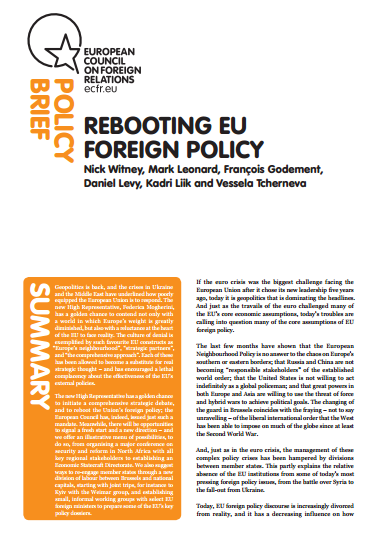Rebooting EU Foreign Policy
The EU is ill-equipped to respond to foreign policy crises
Ukraine and the Middle East have underlined how ill-equipped the EU is to respond to foreign policy crises. This policy paper argues that the EU’s new foreign policy High Representative, Federica Mogherini will have to contend not only with a world in which Europe’s weight is greatly diminished but with a reluctance at the heart of the EU to face reality.
The authors argue that the culture of denial is exemplified by cherished EU foreign policy constructs such as “Europe’s neighbourhood”, “strategic partners”, and “the comprehensive approach” which have become a substitute for real strategic thought and have encouraged a lethal complacency about the effectiveness of the EU’s external policies.
“Rebooting EU Foreign Policy” notes the diminishing contribution of member states to a common EU foreign and security policy and suggests ways to re-engage them. It also advocates the following steps to establish a credible foreign policy:
- A comprehensive review of EU external strategy.
- Discarding the discredited ‘neighbourhood policy’; convening a major regional conference on security, development and reform in North Africa; and immediate and massive EU aid to treat Ebola.
- Preparing for Russian escalation over Ukraine (for example through a winter gas crisis or trouble-making in the Balkans) and also preparing to de-escalate with Moscow while keeping Russia on the economic and legal hook for Crimea.
- A common EU approach to technology theft and trade distortion by China; engagement with Beijing on Pakistan, Africa and Iran; and strategic dialogue with other Asian powers.
- Tightening the transatlantic economic partnership whilst diverging as necessary from US foreign policy particularly in the Middle East; complementing US military efforts against Islamic State (IS) with regional diplomacy and humanitarian aid.
- A review of the EU’s moribund Common Security and Defence Policy.
ECFR co-author, Senior Policy Fellow Nick Witney, comments, “The new High Representative has a golden chance to initiate a comprehensive strategic debate, and to reboot the Union’s foreign policy. As power flows away to the east and south and the Western-designed international order unravels, it is past time to replace wishful thinking with strategy and for the new Brussels team to re-engage with the EU member states in a common foreign policy worth the name.“
The European Council on Foreign Relations does not take collective positions. ECFR publications only represent the views of their individual authors.



